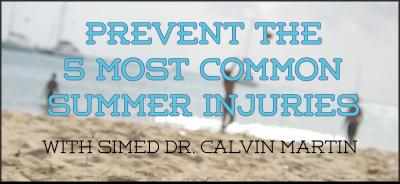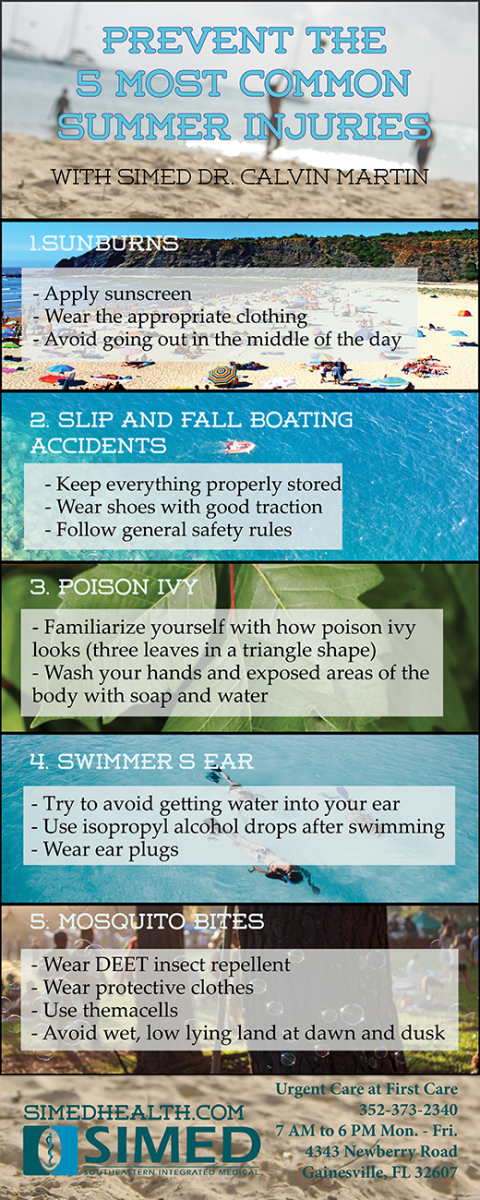
Planning to go swimming at the beach, relax on a boat or do some yard work this summer? Be careful.
Dr. Calvin Martin, a practicing Family Medicine physician at SIMED, sees patients at SIMED’s First Care in Gainesville with injuries related to these activities every summer, but he said it’s easy to avoid and treat these injuries and have a safe summer.
Learn about Dr. Martin’s five most common summer injuries and how to prevent and treat them so you can stay safe while having fun this summer.

1. Sunburns
Every year people come in to see Dr. Martin with severe sunburns, but it’s easy to prevent them.
Sunburn Prevention:
1. Apply Sunscreen.
“Research shows that people don’t apply enough sunscreen. People think that if they use a high SPF, they don’t need to apply it as much or as often, but you should make sure to follow the label on the sunscreen bottle,” Dr. Martin explained.
Each product is different, and people don’t realize, but they tend to lose protection from sunscreen a lot faster when swimming. It’s important to remember to keep reapplying.
Dr. Martin also pointed out that the difference in protection between 100, 50 and 30 SPF is only a few percentage points, and one sunscreen might not protect you significantly more than the other. He recommends using at least 30 SPF.
2. Wear the Appropriate Clothing.
You can wear long sleeved shirts and clothes that are highly rated for sun protection. Wear quick drying, cool nylon.
“You could also apply sunscreen, but if you’re wearing clothes, you don’t have to put sunscreen under them,” Dr. Martin explained.
3. Avoid Going Outside in the Middle of the Day.
“Just choose not to be in the sun right in the middle of the day,” Dr. Martin advised.
You can still get sunburned when it’s cloudy. You can also get sunburned through a window.
Sunburn Treatment:
1. Take ibuprofen or Aleve.
2. Use any kind of lotion to keep your skin moist.
3. Use products with aloe on the burns.
2. Slipping and Falling (Boating Injuries)
During the summer time, more people are out on the water, and if they aren’t careful, being on a boat can lead to some serious injuries.
Slip and Fall Prevention:
1. Keep everything properly stored.
Improperly stored skis, paddles, kneeboards, wakeboards and other materials are all tripping hazards on boats.
“You can even trip on a rope that is lying at the bottom of a boat and break a bone,” Dr. Martin cautioned.
2. Wear shoes with good traction.
Try to avoid flip-flops.
When the boat is wet, people can slip and fall. When people are loading and unloading the boat from the trailer, people can slip on the slick boat ramps and get broken bones and a number of other injuries.
“That’s why wearing the right shoes is important,” Dr. Martin shared.
3. Follow general safety rules.
“My general advice is just make sure people are seated before you drive. Don’t drink and drive your boat. Make sure you pay attention and use caution,” Dr. Martin warned.
Slip and Fall Treatment:
1. Put ice on any kind of sprain, strain or injury.
2. Don’t use the injured body part until it gets examined by a doctor.
3. Severe pain and rapid bruising are good reasons to come in and get checked out as well.
3. Poison Ivy
Poison ivy can be found anywhere, and you can go weeks without noticing you were in contact with it. It’s important to know how to avoid it and what to do if you think you’ve come into contact with it.
It can take a few hours to two weeks for the rashes to show up, so it’s important to always be on your guard.
Poison Ivy Prevention:
1. Familiarize yourself with what poison ivy looks like.
“Get on the internet or get a book and see what poison ivy looks like,” Dr. Martin suggested.
Poison ivy has three leaves in a triangle shape and a matte texture.
Poison ivy can be anywhere. If you’re pulling out weeds from old dead limbs, you can get poison ivy on your hands and not even notice it especially if you can’t recognize poison ivy.
2. Wash your hands and exposed areas of the body with soap and water.
“Wash your exposed areas with soap and water to get off the oil that got on your skin,” Dr. Martin recommended.
When people get the rashes, they usually think back to a time they were doing yardwork or going on a walk through the forest or another occasion. Because poison ivy contact can go undetected, you can accidentally get it on your hand and transfer it to another part of your body or someone else by touching them. That’s why it’s important to clean afterwards.
“People think two weeks later after they get the rash that when they scratched it, it transferred to another area of the body, but it can’t transfer to another body part, or to someone else, after you’ve washed the parts of your body in contact with it,” Dr. Martin explained.
Poison Ivy Treatment:
Poison ivy rashes have a more linear pattern than other rashes. If you think you’re infected with poison ivy, start treatment immediately as it can take days to weeks to heal.
1. Treat it with hydrocortisone cream.
2. Treat it with oral or topical Benadryl.
3. If the rash gets worse, go to the doctor for stronger treatments.
4. Swimmer’s Ear
Did you know Swimmer’s Ear isn’t just for swimmers? Swimmer’s Ear is when liquid gets trapped in your ear canal. You can get it in the shower, when you sweat or even when someone shoots champagne into your ear.
Swimmer’s Ear Prevention:
1. Try to avoid getting water into your ear.
2. After swimming, use isopropyl alcohol drops to drain the water out.
“While some people’s anatomy makes them more likely to get Swimmer’s Ear, it’s a good idea for everybody to use isopropyl alcohol after swimming,” Dr. Martin recommended.
3. Get ear plugs.
“People who are subject to getting it can purchase wax ear plugs that will mold to the shape of their ear and stop it from getting trapped,” Dr. Martin suggested.
Swimmer’s Ear Treatment:
Usually, symptoms become noticeable a few days after contact. Symptoms include pain, swelling, decreased hearing and painful chewing.
There isn’t a lot you can do to treat Swimmer’s Ear. If you get it, schedule an appointment with your doctor so they can prescribe treatment.
5. Mosquito Bites
Pesky mosquitos are more prevalent during the summer, and people spending more time outdoors increases the hazard of mosquito bites.
Mosquito Bite Prevention:
1. Wear DEET insect repellent.
“DEET is the best and comes in varying degrees of strength. For DEET, the strength you’d use would depend on the amount of mosquitos in the area,” Dr. Martin explained.
While some people might avoid DEET due to health concerns, it’s generally regarded as safe.
2. Wear protective clothes.
3. Use thermacells.
Thermacells are butane torches that heat an area and keep mosquitos out of it. They’re useful if you want to keep mosquitos away from a specific location.
4. Avoid wet, low-lying areas, especially at dusk and dawn.
Mosquitos are most prevalent at dawn and dusk, and they breed in wetlands which makes them more active in those areas.
Mosquito Bite Treatment:
1. Apply Benadryl topically or orally.
2. Use Hydrocortisone cream.
3. Use Sting Stop.
4. Avoid scratching the bites.
“Scratching them will only make it itch more,” Dr. Martin cautioned.
If there is an infection, redness or swelling around the bite that worsens over a couple of days or you have trouble breathing or swallowing go to a doctor.
Now that you know how to prevent and treat these common summer injuries, you can prepare yourself for time spent out in the summer sun. Remember to always be alert and stay safe.
If you have one of these injuries and feel like you need to see a doctor, you should contact an urgent care facility like SIMED’s First Care in Gainesville at 4343 Newberry Road for treatment.
You can reach First Care at 352-373-2340 or walk in without an appointment between 7 a.m. and 6 p.m. Monday through Friday.
Dr. Martin sees patients with urgent care-related needs at First Care. If you’re interested in scheduling an appointment with him, call the number listed above or request an appointment through SIMEDHealth.com.